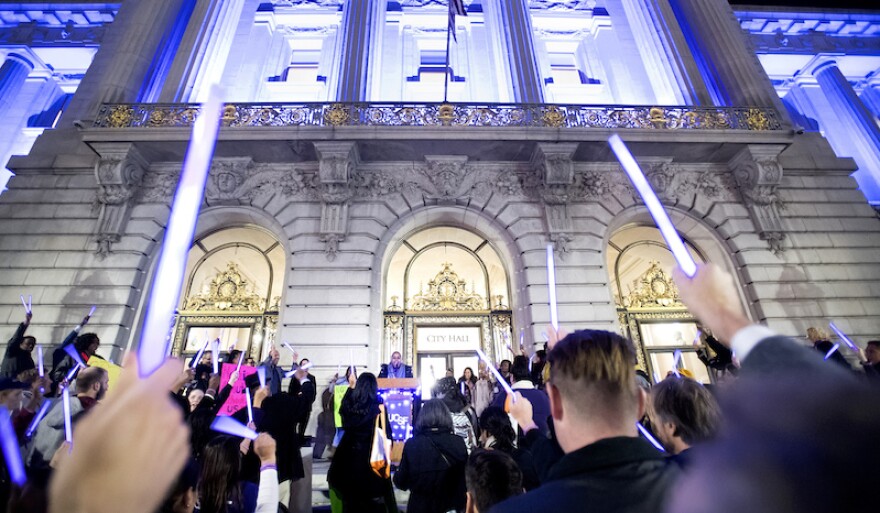Babies being born early is the No. 1 cause of infant mortality in the United States. After years of decline, it’s back on the rise, particularly for Black women. Now mothers around the Bay Area are demanding solutions.
“All right, San Francisco! If you are feeling good say, ‘ashé’! If you are ready to end health inequity, let me hear you say ‘ashé!’”
That’s the chant — using the Yoruba word for certainty and strength — I heard on a recent Thursday evening, when close to fifty women and their families gather on the steps of City Hall, waving purple lights.
The rally and chanting was part of a larger protest against high infant-mortality rates in the Bay Area — particularly among Black women.
The chants continue: “40 Weeks! 40 Weeks!” It’s a rallying cry for many there who experienced preterm birth — that’s when a child is born before 37 weeks.
Babies being born too early is the number one cause of infant mortality in the United States. Public health officials thought they had turned the corner, but after nearly a decade of decline, preterm birth is back on the rise.
Researchers at University of California, San Francisco, are working with mothers — especially women of color, who are hit hardest by this issue — from around the Bay Area to determine root causes, and solutions.
“I was born early,” says Shyanne, an energetic eight-year-old at the event. “I was a preemie.”
She was born at 31 weeks, according to her mother Shawnte Beck.
“It was really, really stressful,” Beck says. “There was a point that they weren’t sure. And — I mean, I don’t want to say this in front of her — but there was a point when I was like, ‘If she doesn’t make it, that’s it for me.’”
Beck works with the Preterm Birth Initiative. It’s a partnership between researchers at UCSF and women of color who have had preterm births.
Nationally, just under ten percent of babies are born preterm. But for Black women in San Francisco, that number is about 14 percent.
At tonight’s rally — marking World Prematurity Day — the goal is to raise awareness of preterm birth and advocate for health equity.

One of the signs on the steps reads: “Nothing about us without,” a reflection of the Premature Birth Initiative’s mission to put women who have actually experienced preterm birth in charge of policy change.
Monique LeSarre is the executive director of Rafiki Coalition for Health and Wellness, based in San Francisco’s Bayview neighborhood. Blinking back tears, she calls on the “power of story” before launching into her own.
“So my parents were 20 and 21 years old,” she says. “They lived in poverty in rural Pennsylvania. They had no running water. No electricity. My father had been recently released from three years in the federal pen. I was a preemie born in 1970 at 27 weeks.”
LeSarre says she never considered how her own prematurity affected her before she learned about the Preterm Birth Initiative.
“I didn’t think about my ADHD, my dyslexia, my weight gain, my depression, my anxiety. I thought they were the product of toxic stress, racism, intergenerational poverty. I had not added this extra piece. I did not know that in 1970 they didn’t talk about babies being born at 27 weeks because they didn’t survive.”
Babies who survive preterm birth are at risk for a long list of health complications, such as cerebral palsy, breathing problems, and learning disabilities. Other countries — like Japan and Canada — fare significantly better than the U.S.
Why does the U.S. struggle on this issue, especially when it comes to poor women and women of color? Researchers aren’t 100 percent sure, but women here say they’ve learned there’s one common denominator:
“The overarching issue is stress,” says Brianne Taylor, who also works with the Preterm Birth Initiative. She says that while stress can come from a variety of sources, one looms largest in the Bay Area.
“Stress that comes from simply surviving,” she says. “Stress that comes from inadequate housing. From not knowing if you’re going to be evicted from your housing today, or if you’re even going to get housing tomorrow.”
So what does Taylor’s want from City Hall?
“We want first and foremost a classification for pregnant women. Too often in housing, single people who are pregnant aren’t able to apply for the public housing because they aren’t yet a family. That interim period is so, so, so important. They cannot be left out,” she says.
As the rally draws to a close, singer Iminah Ahmad lead the crowd in an affirmation. She invokes the Oshun, a Yoruba Goddess associated with motherhood, and ends with a chant:
“You got to say it one more time: From ghetto to goddess! So this song is dedicated to all people under oppression. Since we all have a belly button we all came from the goddess, ashé?”
“Ashé!”the crowd called, waving their violet lights. Ashé: So it will be.






